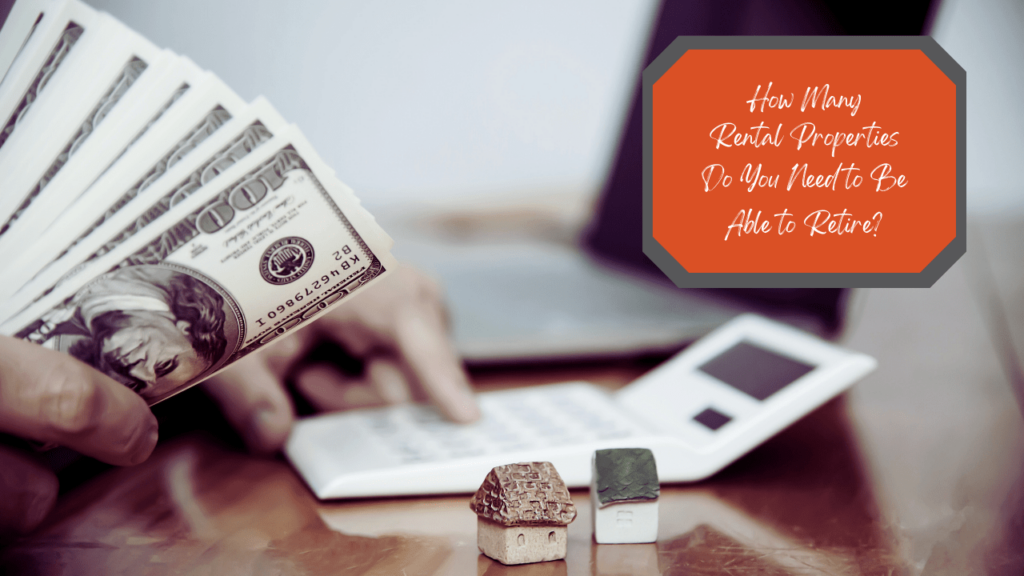
Real estate investments can fund your retirement. When you are earning enough cash flow from the properties you’re renting out, it’s easy enough to live off that money. But, how many rental properties do you need in order to retire comfortably on that income?
The answer is – it depends. It depends on your lifestyle and how much money you need to meet your needs every month. It also depends on the portfolio of properties you own; are they likely to be occupied by stable, long-term tenants, or will there be long stretches of vacancy? Are you having them managed professionally, or are you taking care of the leasing, management, and maintenance yourself?
Answering these questions will help you determine how many rental properties in Idaho Falls and Pocatello you need to ensure you’re earning enough during your retirement.
There’s no precision when it comes to determining how many rental properties you need. But, there are some simple formulas you can use as a base starting point.
Let’s take a look at how to calculate the amount of money you need, what that means for your portfolio, and how to manage the variables and risks that always show up in the real estate investment industry.
Doing the Basic Math
To understand how many rental properties you need in retirement, you must first decide how much money you need every month in order to be comfortable. Everyone has a different set of retirement expenses. You might need a robust travel budget, for example, and you’ll need to budget for that. Or, maybe your expenses will be lower than they are now because you’re planning to downsize into a smaller home. Before you can determine how large your investment portfolio has to be, you must know how much money you’ll need.
So, when we’re talking about the formula that identifies the number of properties you need, it’s important to first know the monthly income you’re going to need. The next number you need to know is the cash flow that each of your properties generates.
Here’s an example. If you’ve decided that you need $5,000 per month to retire happily, you can get that in a number of ways. You can own 10 rental properties that generate $500 a month in cash flow for you. Or, if all of your properties are paid off and you don’t have mortgage expenses to contend with, you can perhaps own five properties that generate $1,000 per month for you.
As you can see, the number of properties you need will depend on your market, the rental value of your investments, and the expenses you need to pay out of that income before you can pocket the profits.
Your calculation is to simply divide the amount of monthly income you need by the cash flow each property generates.
Planning and budgeting for your retirement is obviously more nuanced than a simple division formula. This is your starting point, however, and a good way to get an idea about how much money you’ll need and how many properties you’ll need to acquire in order to make that money.
Understanding Your Retirement Income and Expenses
Before you know what you’ll need, you must understand what you’ll spend while in retirement. Are you earning income from any other source, or will the rental properties be your only source of income? That’s something to establish first; how much money you’ll have coming in before you begin to calculate the rental income.
Owning 10 rental properties in Idaho City is going to deliver different financial results than owning 10 rental properties in Seattle or Baltimore. The cost of your investments will be different in each location, and so will the cost of living. Evaluating your income and expenses has to include considerations for where you’ll be living and how much you’ll be spending on basics such as housing, transportation, groceries, utilities, and health care.
The answer to ‘how many properties do I need’ will require a strategy that’s unique to your financial situation as well as your geography.
Before you can answer your question, you’ll need to know:
- What your living expenses will be in retirement
- How much money you’ll need to meet those expenses
- How much money you’ll need above and beyond those expenses for recreation, travel, emergencies, savings, etc.
- How much rental income you will need to ensure you’re meeting that monthly goal.
So, instead of deciding how many rental properties you want to own, decide how much money you want those rental properties to generate every month. Then, you can decide if that means you need six rental properties or 10 or 16. Once you’re clear on your monthly financial goal, you can work backward from there to figure out how many rentals you’d need.
Choosing Investment Properties to Meet Your Retirement Goals
The amount of money you earn on rental properties will depend on the type of rental property you invest in. The number of properties you’ll need to retire will be impacted by whether we’re talking about single-family homes, multi-family units, or entire apartment buildings.
Income received from each property will depend on:
- Property type
- Property location
- Acquisition price
- Rental value
- Vacancy and turnover
The market will have its own say in how much you’re earning from each property as well. Sometimes, rental rates are seasonal. Sometimes, they’re on a consistent climb up, as we’ve seen in recent years, and sometimes they start to slip, especially when the demand falters and the supply is more than adequate.
If you already own a portfolio of rental properties, you know what they’re earning. It’s easy to estimate what kind of cash flow you can expect, especially as you continue to pay down any mortgage debt you have and make improvements to the property condition.
When you’re investing in new properties, you need to think about your retirement goals before you buy. It’s important to know how much money your property will make for you. It’s easy to overestimate how much you’ll earn in cash flow. Don’t make this mistake.
Expenses, taxes, and fees for services such as property management will take a portion of your income. There’s likely to be maintenance needed from time to time. There might be expensive emergencies or replacements that cost a lot.
Using Debt to Leverage Your Real Estate Investments
If you cruise into retirement with all of your rental properties paid off, your calculations are easy. You’ll know exactly how many rental properties you need, because the money you earn will almost be entirely yours to bank. You might realize that you can even sell a property or two and still earn the monthly minimum that you need to retire.
There are pros and cons to keeping your investments financed as well as to owning them free and clear. Here are some of the things to consider:
Borrowing Money to Buy More Properties and Grow Your Portfolio:
Pros:
- A fixed rate on your mortgage means you’ve locked in a long-term debt that’s secured by your properties. It’s a hedge against inflation.
- After cash flow, you’re also receiving growth because your loans are amortizing.
- You’re holding onto cash for reserves or additional purchases.
- Tax breaks are available on the mortgage interest you pay.
Cons:
- There’s a big mortgage payment to be made every month.
- Negative cash flow is possible, especially early on, when your payments are higher than your income.
- Finding low-cost mortgages is not as easy as it once was.
- Your portfolio can be at risk if the economy or the market completely tanks.
Paying in Cash and/or Owning Your Investment Properties Free and Clear
Pros:
- Everything you earn in rent is yours, outside of the insurance, taxes, and maintenance costs that you need to meet. There’s no big mortgage payment to depress your income.
- Less risk of deflation. Even if the economy crashes, you don’t have debt to pay off. Lowering your rents if necessary will not cause your own financial turmoil.
- You earn more as your rental value increases.
Cons:
- You’ll need a lot of capital if you want to pay in cash.
- You may be able to buy fewer properties at a time, which takes longer to get to your retirement goals.
Saving for retirement is something we’re told to do from the moment we start working a full-time job. If you’re planning to use rental properties to finance most of your retirement, that’s something you want to plan as soon as possible. Begin acquiring those properties over time, even when you’re several decades out from retirement. You’ll find the process is much easier to navigate, and you’ll answer your own questions sooner. As you begin to acquire new investments and think about the lifestyle you want to live when you’re retired, you’ll know how many rental properties you need.
 We love helping investors strategize for scenarios just like this. If you’d like to talk about property management in Idaho Falls or Pocatello or you want some help pulling apart the financial realities of your eventual retirement, we can help. Contact our team at Jacob Grant Property Management.
We love helping investors strategize for scenarios just like this. If you’d like to talk about property management in Idaho Falls or Pocatello or you want some help pulling apart the financial realities of your eventual retirement, we can help. Contact our team at Jacob Grant Property Management.
